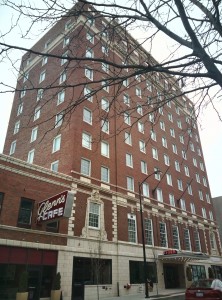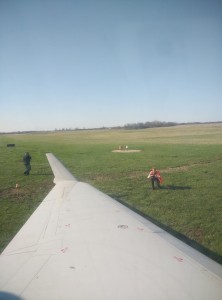Columbia was my first introduction to an American small town while participating in the Alfred Friendly Press Partners fellowship program. The Midwestern city that is home to the University of Missouri was to be our host for a fortnight for journalism training.
The days ahead had interesting moments and lots of learning.
Anyone entering Columbia is likely to notice the small airport first – so small that you can simply get out of the plane and be in your car in less than five minutes (and this includes your baggage pickup). It has no aerobridges, no long walks and just a few taxis. There are green pastures all around you and just two planes were parked when our plane landed. Even these were small Cessna Aircraft Company planes. I guessed it right that the place doubles up as a flying club. A flying club where big planes land sometimes – four times daily to be specific.
The nearly 35,000 students that study in the university were out on a Spring break. Columbia, with rain drizzling and green shoots emerging after a tough winter, was very quiet.
The Tiger Hotel, located a couple of blocks from the southern entry of our university, was to keep us warm in the fortnight. The silence broke in an astonishing way: the hotel’s fire alarm went off in the middle of our second night.
“A fire has been detected in the building… you are requested to take the stairs down to the lobby,” a recorded female voice yelled between hoots again and again. If you have just arrived in a new country you are more likely to be careful. No wonder my fellow colleague and I were among the first to run downstairs. We would find ourselves with guests in uncomfortable attires trooping down to the lobby only to be told a few minutes later that it was false alarm. We overheard that someone had simply used excessive hot water to bathe.
It would have been fine if the alarm was unkind to us just once. But it became a ritual repeated every few days. And like it happens with immunity, people just stopped listening to the alarm and running to the lobby.
At the university we had long and fruitful sessions at the Missouri School of Journalism in story writing, enterprise, ethics, multimedia, mobile reporting, data journalism, American culture and many others. The journalism school is the oldest in the world and you could sense its age not only from the extensive display of pictures but from the massive trees planted systematically all around (inside the building, however, it was a digital world loaded with the latest Apple machines).
Two lions carved in stone welcome you to the Missouri School of Journalism. These stone lions were carved 531 years ago in China and gifted by the Chinese National Government to school in 1931.
For a country that is sometimes criticized for not having enough press freedom, the Chinese lions stand as testimony for the work in progress, I thought to myself.
We left the city early April but not from the same small airport. Our America Airlines Inc’ Bombardier Inc-made CRJ plane went into a ditch while taxiing for liftoff and refused to budge. We spent an extra night in the scenic city of Columbia. The next day we drove two hours at dawn to the St Louis airport as our plane had refused to leave the taxiway still and therefore the airport remained shut. Having been an aviation reporter for some years it was an unusual experience to be part of an air safety incident first hand. I hope the Federal Aviation Administration is effective but kind to the pilots and the salaries of these pilots flying regional planes is also brought at par with the mainline hub carriers.
ps: tweets of the plane incident got noticed in print and on television






